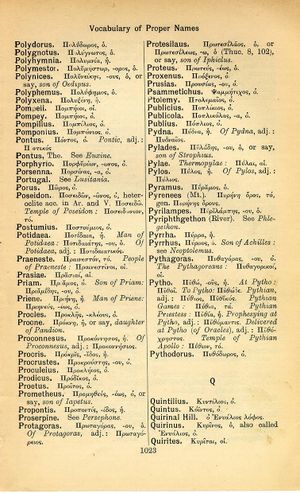Prometheus: Difference between revisions
οὐχὶ σοῦσθ'; οὐκ ἐς κόρακας; οὐκ ἄπιτε; παῖε τῷ ξύλῳ → You will not go? The plague seize you! Will you not clear off? Hit them with your stick!
(Names) |
(6_13) |
||
| Line 1: | Line 1: | ||
{{WoodhouseENELnames | {{WoodhouseENELnames | ||
|Text=[[File:woodhouse_1023.jpg|thumb|link={{filepath:woodhouse_1023.jpg}}]][[Προμηθεύς]], -έως, ὁ, or say, <b class="b2">son of Iapetus.</b> | |Text=[[File:woodhouse_1023.jpg|thumb|link={{filepath:woodhouse_1023.jpg}}]][[Προμηθεύς]], -έως, ὁ, or say, <b class="b2">son of Iapetus.</b> | ||
}} | |||
{{Lewis | |||
|lshtext=<b>Prŏmētheus</b>: (trisyl.), ĕi and ĕos, m., =[[Προμηθεύς]]> (the Forethinker),<br /><b>I</b> a [[son]] of [[Iapetus]] and [[Clymene]], [[brother]] of [[Epimetheus]], and [[father]] of [[Deucalion]]. He formed men of [[clay]], and [[animated]] [[them]] by [[means]] of [[fire]] brought from [[heaven]]; for [[which]] he [[was]] fastened to [[Caucasus]], [[where]] a [[vulture]], or, as [[some]] [[say]], an [[eagle]], fed [[upon]] his [[entrails]], [[until]], at [[last]], it [[was]] [[slain]] by [[Hercules]], Cic. Tusc. 3, 31, 76; Auct. Her. 4, 6, 9; Hor. C. 1, 16, 13; Ov. M. 1, 82; Hyg. Fab. 54; 144; Verg. E. 6, 42; Prop. 3, 3, 29 (4, 4, 7); Mart. 11, 85, 9; Stat. Th. 11, 478; Lact. 2, 10, 5.—Poet., transf., of a [[skilful]] [[potter]], Juv. 4, 133.—Hence,<br /> <b>A</b> Prŏmēthēus, a, um, adj., of or belonging to [[Prometheus]], Promethean: juga, i. e. the [[Caucasus]], Prop. 1, 12, 10; also called [[rupes]], Mart. 9, 46, 3: [[fibra]], of [[Prometheus]], Val. Fl. 7, 356: [[creta]], Col. poët. 10, 59: [[lutum]], Mart. 10, 39, 4: [[cruor]], Ov. Am. 2, 16, 40: [[manus]], Stat. Th. 8, 305.—<br /> <b>B</b> Prŏmēthĭădes, ae, m. [[patron]]., the [[son]] of [[Prometheus]], [[Deucalion]], Ov. M. 1, 390. | |||
}} | }} | ||
Revision as of 08:54, 13 August 2017
English > Greek (Woodhouse)
Προμηθεύς, -έως, ὁ, or say, son of Iapetus.
Latin > English (Lewis & Short)
Prŏmētheus: (trisyl.), ĕi and ĕos, m., =Προμηθεύς> (the Forethinker),
I a son of Iapetus and Clymene, brother of Epimetheus, and father of Deucalion. He formed men of clay, and animated them by means of fire brought from heaven; for which he was fastened to Caucasus, where a vulture, or, as some say, an eagle, fed upon his entrails, until, at last, it was slain by Hercules, Cic. Tusc. 3, 31, 76; Auct. Her. 4, 6, 9; Hor. C. 1, 16, 13; Ov. M. 1, 82; Hyg. Fab. 54; 144; Verg. E. 6, 42; Prop. 3, 3, 29 (4, 4, 7); Mart. 11, 85, 9; Stat. Th. 11, 478; Lact. 2, 10, 5.—Poet., transf., of a skilful potter, Juv. 4, 133.—Hence,
A Prŏmēthēus, a, um, adj., of or belonging to Prometheus, Promethean: juga, i. e. the Caucasus, Prop. 1, 12, 10; also called rupes, Mart. 9, 46, 3: fibra, of Prometheus, Val. Fl. 7, 356: creta, Col. poët. 10, 59: lutum, Mart. 10, 39, 4: cruor, Ov. Am. 2, 16, 40: manus, Stat. Th. 8, 305.—
B Prŏmēthĭădes, ae, m. patron., the son of Prometheus, Deucalion, Ov. M. 1, 390.

